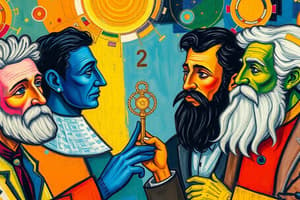Podcast
Questions and Answers
Sino ang kilalang astronomo at pisikong nagkaroon ng malaking kontribusyon sa ating pag-unawa sa universe sa pamamagitan ng kanyang pagmamasid at pagpapaunlad ng teleskopyo?
Sino ang kilalang astronomo at pisikong nagkaroon ng malaking kontribusyon sa ating pag-unawa sa universe sa pamamagitan ng kanyang pagmamasid at pagpapaunlad ng teleskopyo?
Galileo Galilei
Ano ang tanyag na frase ni René Descartes na nagsasabing, 'Nag-iisip ako, kaya't ako ay mayroon'?
Ano ang tanyag na frase ni René Descartes na nagsasabing, 'Nag-iisip ako, kaya't ako ay mayroon'?
Cogito, ergo sum
Sino ang pisikong at matematikong bumuo ng mga batas ng kilos at pangkalahatang gravitasyon, na naglagay ng pundasyon para sa klasikal na mekanika?
Sino ang pisikong at matematikong bumuo ng mga batas ng kilos at pangkalahatang gravitasyon, na naglagay ng pundasyon para sa klasikal na mekanika?
Isaac Newton
Ano ang itinuturing na isa sa mga pangunahing layunin ng Agham na Panahon ng Pagbabago?
Ano ang itinuturing na isa sa mga pangunahing layunin ng Agham na Panahon ng Pagbabago?
Signup and view all the answers
Ano ang itinuturing na pangunahing pamamaraan ng Agham sa panahon ng Scientific Revolution?
Ano ang itinuturing na pangunahing pamamaraan ng Agham sa panahon ng Scientific Revolution?
Signup and view all the answers
Ano ang kontribusyon ng eksperimentalismo sa Scientific Revolution?
Ano ang kontribusyon ng eksperimentalismo sa Scientific Revolution?
Signup and view all the answers
Paano nakatulong ang matematika sa siyentipikong pagsisiyasat noong Scientific Revolution?
Paano nakatulong ang matematika sa siyentipikong pagsisiyasat noong Scientific Revolution?
Signup and view all the answers
Ano ang naging epekto ng astronomy sa Scientific Revolution?
Ano ang naging epekto ng astronomy sa Scientific Revolution?
Signup and view all the answers
Ano ang konsepto ng heliosentrismo at paano ito nakaimpluwensya sa Scientific Revolution?
Ano ang konsepto ng heliosentrismo at paano ito nakaimpluwensya sa Scientific Revolution?
Signup and view all the answers
Paano nakaapekto ang Scientific Revolution sa interes sa pagsasaliksik?
Paano nakaapekto ang Scientific Revolution sa interes sa pagsasaliksik?
Signup and view all the answers
Study Notes
The Scientific Revolution: A Game-Changer in the History of Science
The term "Scientific Revolution" is used to describe a series of developments in the 16th and early 17th centuries that transformed the way we understand the natural world. This period, which lasted roughly from the 1540s to the 1680s, marked the shift from a medieval perspective, dominated by Aristotelian ideas, to a modern, empirically-based understanding of the physical world.
Key Figures and Ideas
Some of the most influential thinkers during the Scientific Revolution include:
- Galileo Galilei (1564–1642), an astronomer and physicist, who made significant contributions to our understanding of the universe through his observations and the development of the telescope.
- Isaac Newton (1642–1727), a physicist and mathematician, who formulated the laws of motion and universal gravitation, laying the groundwork for classical mechanics.
- René Descartes (1596–1650), a French philosopher, mathematician, and scientist, who is often described as the father of modern philosophy. He is best known for his famous phrase, "Cogito, ergo sum" (I think, therefore I am).
Methodological Approach
The Scientific Revolution was characterized by a shift in methodology, moving away from Aristotelian philosophy and relying more on empirical evidence. Key aspects of this approach included:
- Experimentalism: Scientists began to experiment with natural phenomena and observe their results, leading to a better understanding of how the world works.
- Mathematization: The use of mathematics in scientific inquiry became increasingly important, as it allowed for more precise and accurate measurements and predictions.
- Observational astronomy: The development of the telescope enabled astronomers to observe the cosmos in greater detail, leading to the discovery of new celestial bodies and a better understanding of the solar system.
- Heliocentrism: The idea that the Earth and planets revolve around the Sun became increasingly accepted, replacing the geocentric model that had been dominant since ancient times.
Impact on Society
The Scientific Revolution had a profound impact on Western society and influenced various aspects of culture, economics, and politics. Some of the most notable changes include:
- Advancements in technology: The scientific discoveries of the period led to the development of new technologies, such as the steam engine, which had a significant impact on industry and transportation.
- Increased interest in exploration: The newfound understanding of the natural world fueled a desire to explore and discover new lands, leading to the Age of Exploration.
- Religious and philosophical change: The Scientific Revolution challenged the established religious and philosophical systems of the time, leading to a shift in worldviews and a greater emphasis on reason and evidence.
Conclusion
The Scientific Revolution was a pivotal moment in the history of science, marking a turning point in our understanding of the natural world. Key figures such as Galileo, Newton, and Descartes, along with the development of new methodologies and technologies, led to a transformation in how we perceive and interact with the world around us. The impact of these developments can still be felt today, as they have shaped our understanding of the universe and our place within it.
Studying That Suits You
Use AI to generate personalized quizzes and flashcards to suit your learning preferences.
Description
Learn about the significant developments and key figures during the Scientific Revolution that transformed the way we understand the natural world in the 16th and early 17th centuries. Discover the shift from medieval perspectives to modern, empirically-based understanding through advancements in methodology and technology.




